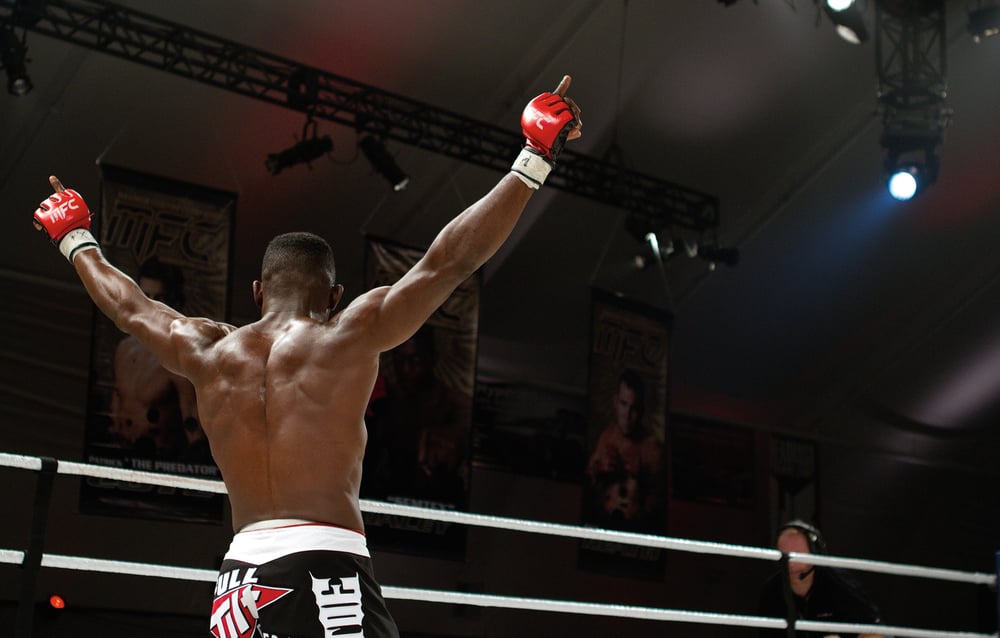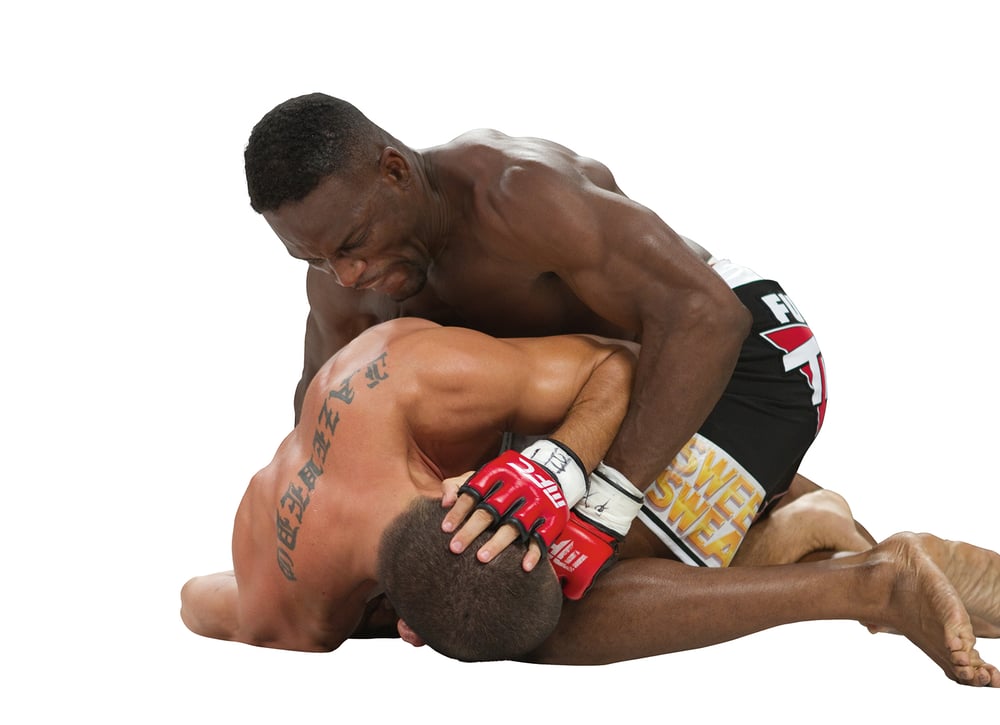
Issue 071
January 2011
Controversial, entrepreneurial and spiritual, alpha male Antonio McKee finally has his place in the big league
Antonio McKee has been a professional mixed martial artist for 11 years, the past seven of which have gone by without a single loss. His overall professional record is a gaudy 25-3-2 and he’s the reigning lightweight champion at Canada’s Maximum Fighting Championship. Normally, any one of those accomplishments would have landed McKee in the UFC ages ago. Instead, McKee is a 40-year-old cult figure who’s known more for his perceived-to-be outlandish personality – and notoriously conservative fighting style. His freshly minted UFC contract and scheduled lightweight bout with Jacob Volkmann at UFC 125 on January 1st could put an end to that, but McKee, as always, is unapologetic about who he is and remains perfectly willing to explain how that has kept him out of the limelight.
“Antonio McKee is a patient person and in the beginning I started my career off doing things a little different than most people – I started out winning,” he says, already darting in and out of his trademark third person narrative. “Not only that, but I was running my own gym and shows. I was intimidating to people because they knew damn well they couldn’t control me with money like these other fighters.” It would be easy for McKee to come off as bitter. But instead he’s matter-of-fact: one imagines everything he says could be verified with a quick trip to the local library. It’s a self-assured nature he credits to a survivalist childhood, one that makes politicking promoters and vitriolic fans seem like gnats waiting to be swatted away. “I grew up in Tennessee and Ohio during the ‘70s and those were extremely bad places to be if you were of color. It was serious. There were days I couldn’t go across the street to play because of KKK rallies. All day, every day, what I saw was knives, guns, drugs, jackings, killings… you name it.” Solemnly, and without his usual panache, McKee says, “It was a disgusting place. The projects I lived in, the walls were made of concrete and the toilets were made of steel. Basically, you were talking about a starter prison for young people of color, like they wanted you to get used to it.”
Throw in a mother strung out on drugs, and a mostly absent alcoholic father, and the table was set for McKee to become just another young, black statistic. For a while, he played the role perfectly. “I spent time in foster homes, with my grandmother, then group homes, then with my aunt. And this is just the stuff I can remember. Even though I was this scrawny kid, I was wild and just too much for people to handle. In the ghetto people knew Antonio McKee was the scrawny little nigga you didn’t f*ck with,” he says. But McKee reveals the vulnerabilities underneath his boisterous facade: “The whole time I was acting out, I think I just wanted a real family, a mom and dad. Unfortunately, that wasn’t how it went for me.”

For all the trouble McKee got himself into, he managed to avoid the ultimate temptation of selling drugs. Always an exceptionally bright person – a fact confirmed by the numerous mental health evaluations he underwent as a child – he concluded early on that dealing would be too easy, and a betrayal of the natural work ethic he believes to have inherited from slave ancestors. Instead of shifting dime bags and moving grams, McKee found temporary distractions by putting his mind to work. A self-described ‘first-generation recycler’, he would build contraptions from the garbage he found on the streets of whatever ghetto he called home. However, it wasn’t until McKee first stepped onto a wrestling mat as a teenager that his gifted mind found a way to work in harmony with his natural athleticism. The crazy skinny kid from the projects was a natural, and quickly found his way out thanks to wrestling. However, McKee never allowed himself to become dependent on sports to make a living. The work ethic that always dwelled inside him morphed into an entrepreneurial spirit. His lucrative business ventures include multiple electronics stores and his renowned New York gym The Body Shop.
His business background is perhaps what most differentiates McKee from the average fighter desperate to make their way into a major promotion. McKee’s financial independence gives him the freedom to be an outspoken critic of MMA’s sometimes one-sided finances. “Fighters are controlled by economics. Me? Antonio McKee already made his money, brother. Fighting is just an extra edge,” he says. “Some of the people in this game, they will use money to control you. They will use it to make you give up who you are and that’s why I tell everyone I train with the same thing – don’t be a house nigga. Know where you come from. And use all that money
to make a change in your community.” Neighborhood and family, the two things McKee was most in need of as a child, are now of the utmost importance to him as an adult.
He runs an organization named ‘Fight for Kids’ that he funds mostly out of his own pocket, to provide athletic programs for underprivileged youth in urban communities. He’s also the proud father of three children and happily married to his wife Jennifer. Really, if not for his MMA career, McKee would be a model citizen.

However, that doesn’t change McKee’s well-known penchant for hyperbolic self-glorification. When asked about his upcoming opponent Jacob Volkmann, McKee seems more focused on making his intentions in the UFC clear as day. “I got nothing bad to say about Jacob Volkmann, but I’m here to get that title and he’s a stepping stone for me. Now, you think about Frankie Edgar, a wrestler, Gray Maynard, a wrestler, all these guys that would have to face Antonio McKee are wrestlers. Unfortunately for them, I’m a better wrestler. That creates a serious problem because it means I’m gonna be on top and they’re gonna be on the bottom gettin’ beat on.” While there is obviously much more to MMA than just wrestling, McKee has long encouraged his opponents to do something to keep him from grinding them out until the final bell. No one has been up to the challenge in some time and it’s a fact he’s quick to point out. “Is anybody gonna submit me? Absolutely not, because I have the submission game figured out. Is anybody gonna knock me out? Absolutely not. Why? I haven’t been touched in forever. Can anyone stop me from taking them down? Well, that’s controversial. It depends. But once I get the takedown, I’ve got too much history, brother.” McKee says as he starts drifting into pro wrestling territory before laying down a case that’s awfully tough to argue with. “I’ve learned how to use wrestling for MMA and a lot of these guys are still trying to learn how to put it all together. I’ve been doing this for too long. So I say go ahead and put me in the cage with anyone for five minutes, 15 minutes, 25 minutes, whatever. I wanna see someone stop me and then I’ll shut up. But until then? I’m not staying quiet for anybody.”
This is the point where many fans grow tired of McKee. MMA is a sport that draws fans in by promising a perfect marriage of athletic dynamism plus over-the-top violence – and McKee isn’t one to play to anybody’s expectations. His explanation for why he doesn’t look to actively hurt his opponents is less so a rationale, more of a challenge to the sport’s fans to take a long, hard look in the mirror. “Have you ever been knocked out? Have any of your family members ever been knocked out? No? So the only way I can make you understand my point is by knocking your kid or your mom out. Then you won’t like knockouts. See?” McKee asks rhetorically, before moving on without skipping a beat. “That’s the problem with this society. We glorify sadistic violence. We love it so much and don’t think about the people getting hurt. I just happen to be cursed with being good at violence.”
This ‘curse’ McKee describes is very real, in his mind. He’s a deeply religious man who lives with the knowledge that he’s all but built to hurt his fellow man. It’s an urge he’s mostly kept in check, but on September 10, 2010 at MFC 26: Retribution the whole world got to see what happens when the crazy kid from the projects gets pushed too far. “In my last fight against Luciano Azevedo, I gotta tell you… I lost myself. He talked some shit and I decided Antonio McKee is going to hurt this man. Sure enough he didn’t last three minutes with me before I had him dripping blood everywhere and needing staples in his head. What scared me was… it took me a minute to feel bad about doing that to another human being. It took time for me to feel bad about sending someone to a hospital,” McKee says, sounding like a man who genuinely fears what he’s capable of. “That was a Friday. On the Sunday I went to church. I was on my hands and knees praying and I started crying. My daughter went up to someone and asked, ‘Why is my daddy crying?’ And they replied, ‘Oh, your daddy is just very happy.’ But I was crying because I knew I was getting ready to go to the UFC and I knew what they wanted from me. They wanted me to become that person who likes hurting people. I just pray God gives me the strength to stay in control of myself. I pray God gives me more submissions so Antonio McKee doesn’t have to put a hole in another person’s head.”
This is what sets Antonio McKee apart. Contests are not viewed in the context of winning or losing, because he just doesn’t think that way about fighting. What really matters to him is that he resists the lingering influence of his violent upbringing, and the ongoing influence of his violent profession. It doesn’t make much sense for a mixed martial artist to be concerned by his own savagery, but McKee clearly doesn’t think of himself as a mixed martial artist. He thinks of himself as a black man, a family man, a community leader, a free thinker and, above all, a human being. If you ever forget that, he’ll be the first to remind you.










